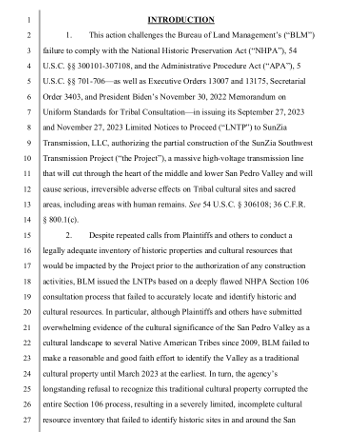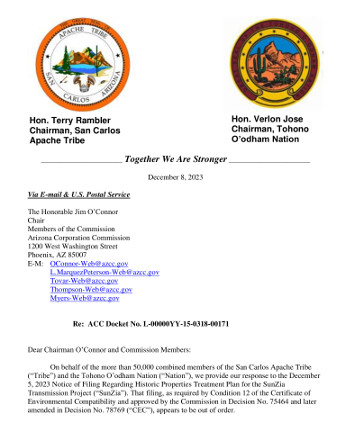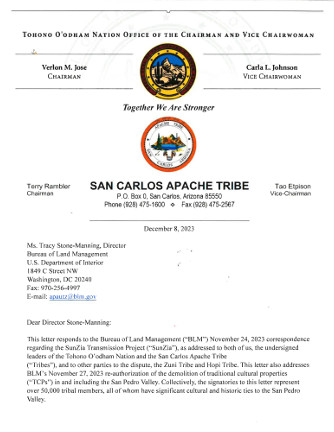Arizona Corporation Commission opens new docket
kai2024-02-23T05:26:24+00:00A new docket number has been opened by the Arizona Corporation Commission, expressly for the Formal Complaint that was filed on February 5, 2023 by the Tohono O’odham Nation, the San Carlos Apache Tribe, Archaeology Southwest, Center for Biological Diversity, and citizen-plaintiff Peter Else, regarding SunZia’s initiation of construction prior to completing the requirements of two cultural resource conditions in their state permit.
The docket number is L-00000YY-24-0042. The docket administrator sent a letter (included in the new docket) to SunZia today, notifying them that they have 20 days to file an Answer pursuant to AAC R14-3-106(H), which provides:
“Answers to complaints are required and must be filed within 20 days after the date on which the complaint is served by the Commission, unless otherwise ordered by the Commission. All answers shall be full and complete and shall admit or deny specifically and in detail each allegation of the complaint to which such answer is directed. The answer shall include a motion to dismiss if a party desires to challenge the sufficiency of the complaint.”
Tribes Demand Halt to SunZia Construction
kai2024-02-08T03:21:19+00:00PRESS RELEASE: FOR IMMEDIATE RELEASE
February 6, 2024
TRIBES CALL ON ARIZONA CORPORATION COMMISSION TO HALT CONSTRUCTION OF THE SUNZIA TRANSMISSION LINE IN ARIZONA
Toronto-based Pattern Energy in Violation of Commission Guidelines, Plans to Desecrate Sacred lands in the San Pedro River Valley without Required Cultural Resource Studies
TUCSON, Ariz. — The Tohono O’odham Nation and the San Carlos Apache Tribe filed a formal complaint with the Arizona Corporation Commission (ACC) on Monday, Feb. 5, 2024 demanding the Commission halt construction of the SunZia high voltage transmission line in Arizona for violating Commission orders. The Center for Biological Diversity and Archeology Southwest joined the Tribes in the complaint.
Toronto-based Pattern Energy is constructing a 550-mile transmission corridor connecting central New Mexico and south-central Arizona with two 500kV transmission lines. Construction of a 50-mile portion of the transmission line will carve up the environmentally sensitive San Pedro River Valley, causing irreparable damage to sacred and cultural sites of the Tohono O’odham Nation, San Carlos Apache Tribe, and other tribes.
“Pattern Energy jumped the gun when it began construction of the SunZia power line through the San Pedro River Valley by failing to prepare and submit required cultural studies to the Arizona Corporation Commission,” said Tohono O’odham Nation Chairman Verlon Jose. “This is the latest example of this Canadian company ignoring legal requirements designed to protect critical cultural sites. The Commission should immediately order Pattern Energy to cease construction until Pattern complies with all Commission orders.”
San Carlos Apache Chairman Terry Rambler said, “Tribes are staunch supporters of renewable energy and encourage responsible energy development. However, Pattern Energy has shown a flagrant disregard for protecting the cultural resources that are vital to our Tribe and other tribes. There are alternative locations to place this powerline rather than through the heart of one the most pristine environmental and cultural landscapes in the Southwest.”
The complaint documents how Pattern Energy has violated two separate provisions of its Certificate of Environmental Compatibility (CEC), which is required by the Commission for the SunZia transmission line. The complaint states that Pattern Energy failed to submit a cultural landscape study and only submitted a partial historic properties treatment plan prior to beginning construction in 2023. Privately-held Pattern Energy acquired SunZia Transmission LLC in July 2022.
The complaint requests the Commission order Pattern Energy to cease construction of the transmission line in Arizona. If Pattern Energy fails to do so, the complaint requests the Commission to suspend the company’s CEC until it complies with Commission orders for the cultural landscape study and completion of the historic properties’ treatment plan.
The ACC complaint comes just less than three weeks after the same parties filed a federal lawsuit against the U.S. Department of the Interior and the U.S. Bureau of Land Management for failure to comply with federal laws and executive orders that would protect cultural sites from the SunZia transmission line. The lawsuit seeks an emergency injunction pending BLM’s compliance with the National Historic Preservation Act. The lawsuit was filed in U.S. District Court, District of Arizona, Case 4:24-cv-00034-JGZ.
Matt Probst
SIMG, Inc.
520-321-1111 office
520-409-4660 cell
Multiple parties file complaint against the Arizona Corporation Commission
kai2024-02-06T17:21:01+00:00On February 5, 2024, attorneys for the Tohono O’odham Nation, the San Carlos Apache Tribe, the Center for Biological Diversity, Archaeology Southwest, and citizen-intervenor Peter Else filed a formal complaint before the Arizona Corporation Commission (ACC) regarding SunZia’s violation of conditions in their state permit that require SunZia to complete a cultural landscape study and a historic properties treatment plan prior to commencing construction. SunZia has admitted that these two documents have not been completed. However, SunZia has already initiated construction in Arizona.
SunZia, the holder of Certificate of Environmental Compatibility No. 171 (“CEC”), has unlawfully begun construction of its transmission lines. The CEC obliges SunZia to submit two substantive documents to the Commission prior to commencement of construction: a cultural landscape study and a historic properties treatment plan. SunZia has submitted an incomplete historic properties treatment plan and has not conducted a cultural landscape study. The Commission is requested to (1) enforce the CEC by ordering SunZia to cease construction until the conditions of the CEC are complied with, and (2) advise SunZia that failing to do so will result in suspension of the CEC until SunZia complies with the CEC’s conditions.
The parties represented in this Complaint are asking the ACC to (1) enforce the state permit by ordering SunZia to cease construction until these cultural resource requirements in the state permit are complied with, and (2) advise SunZia that failing to do so will result in suspension of the state permit until SunZia complies with these cultural resource requirements.
Op Ed on SunZia – Arizona Daily Star
kai2024-02-06T18:01:34+00:00Thoughts on the SunZia project
by Elaine Cummings
February 2, 2024
The reaction of tribes located here in Arizona (my home of over 50 years) is no surprise. In fact, their request probably should have been anticipated because this project’s outline mirrors many other projects of similar ilk.
Too many times, in projects such as SunZia where tribal lands have been involved, the tribal members and their councils either were not included at all, or were left out of early planning, or were brought in and heard late in a process, and then were ignored (ex., KXL, DAPL, Line 3, and other oil pipeline projects). In these examples, many either were “already under construction” or had been “completed without an EIA or permit” represented encroachment on tribal lands and endangered a sole source of fresh water supply … and, as well, threatened the mutual supply of water for non-native citizens. One now is underway in Michigan waters.
Today, with SunZia, another unfortunate fact should be noted — that tribes now must go against U.S. Dept. of Interior Sec. Deb Haaland, herself a Native American (Laguna Pueblo, NM). This is totally unfair to Sec. Haaland because no part of this problem began on “her watch.”
That it even has “come to this” in Arizona with SunZia is beyond astonishing, given the fact that, once more, “our” various government entities either have NOT begun or done or have failed to complete studies that either were requested or were required by all cooperating parties, well before the first project construction foremen ever fired up the first bulldozer! For instance, look no further than the AZ southern border, where a proposed mine finally may have been stopped, but where drastic environmental destruction already has been done, which will take many years for nature and the passage of time to undo and to repair.
I am only one of many citizens who have monitored several of the aforementioned projects for over 10 years. I have remained in contact with advocate organizations, Native American publications, and individuals. As well, I have personal friends within these tribes and others from back East, where I lived before I came to AZ in 1971 … who also are Native Americans. This latest affront is hard to swallow … again … for all of us.
Has no one in our country, or in our Congress, or in our state government, or in assorted NGOs, learned anything from the broken treaties of our historic past, let alone from the continuing malpractice of our more recent times? Is our word, that of “We, The People” not to be trusted … again?
Sadly, it would seem not.
Elaine Cummings, retired since 1997, is a former journalist (Albany Times-Union), publications designer/ editor for other magazines and agencies. She has lived in Tucson since 1971.
Tohono O’odham and San Carlos Apache sue BLM, DOI, Haaland
kai2024-02-06T17:21:58+00:00 Today Plaintiffs Tohono O’odham Nation; San Carlos Apache Tribe; Archaeology Southwest; and Center for Biological Diversity have issued a COMPLAINT FOR DECLARATORY JUDGMENT AND INJUNCTIVE RELIEF to Defendants U.S. Department of the Interior; Deb Haaland, U.S. Secretary of Interior; and U.S. Bureau of Land Management.
Today Plaintiffs Tohono O’odham Nation; San Carlos Apache Tribe; Archaeology Southwest; and Center for Biological Diversity have issued a COMPLAINT FOR DECLARATORY JUDGMENT AND INJUNCTIVE RELIEF to Defendants U.S. Department of the Interior; Deb Haaland, U.S. Secretary of Interior; and U.S. Bureau of Land Management.
This action challenges the Bureau of Land Management’s failure to comply with the National Historic Preservation Act (“NHPA”) and the Administrative Procedure Act (“APA”) as well as Executive Orders 13007 and 13175, Secretarial Order 3403, and President Biden’s November 30, 2022 Memorandum on Uniform Standards for Tribal Consultation—in issuing its September 27, 2023 and November 27, 2023 Limited Notices to Proceed to SunZia Transmission, LLC, authorizing the partial construction of the SunZia Southwest Transmission Project, a massive high-voltage transmission line that will cut through the heart of the middle and lower San Pedro Valley and will cause serious, irreversible adverse effects on Tribal cultural sites and sacred areas, including areas with human remains.
Read the full filing | Article by Bloomberg | Article by the Arizona Republic
Attorneys for Peter Else file opening brief in the Arizona Court of Appeals
kai2023-12-18T00:52:47+00:00Peter Else’s attorneys filed their opening brief in the Arizona Court of Appeals today, December 14, 2023. The case challenges the Arizona permit for the amended version of the SunZia Transmission Project, issued by the Arizona Corporation Commission on November 21, 2022.
The SunZia project has undergone multiple changes in purpose, scope, and route since 2006. Their original Arizona permit was issued by the Commission in 2016. Else established legal standing as a party to the Arizona proceedings in 2015 because of his concerns about the adverse ecological impacts of the project.
Peter Else’s statement
I continue to point out the false and contested statements memorialized in the November 2022 decision by the Arizona Corporation Commission. Rather than acknowledging that a radical change had taken place in the plan of electrical service for the amended SunZia project, the Commission’s staff presented a materially misleading narrative to our elected Commissioners for a vote. The decision made by the Commission must be based on facts in their formal order, not false statements about there being no change in the anticipated use of the project.
The Commission’s staff has passively and uncritically accepted the push from the Biden administration and various politically aligned environmental groups to deliver New Mexico wind energy primarily to the high-priced electricity markets in California, in the process blazing new power line corridors through Arizona rather than following existing corridors to the highest degree possible. The amended version of the SunZia project is now an overpriced vertical monopoly that would harm Arizona’s electricity ratepayers. It is a radical change from SunZia’s previous claims of assuring multiple grid benefits and economical renewable energy for southern Arizona.
Other far less damaging energy development alternatives have existed throughout SunZia’s 17-year history of haphazard planning in Arizona and New Mexico. I feel compelled by conscience to continue to object to this poorly planned project.
Case summary
The Introduction of the opening brief gives the background of the case. The Summary of the Argument outlines why the plaintiff believes that the Arizona Corporation Commission (ACC) erred in 2022 when it granted an amended Certificate of Environmental Compatibility (CEC) for the SunZia transmission line.
The Commission is required by state statute to balance the need for “an adequate, economical and reliable supply of electric power” with the desire to minimize ecological and environmental impacts in Arizona. Plaintiff Else states that the plan of electrical service in the 2022 amended CEC is substantially different from that of the original CEC granted in 2016. He alleges that the amended CEC would create a vertical monopoly of wind power generation and transmission, and would allow SunZia to no longer provide open access and reliability benefits to Arizona’s electrical grid that would have been legally required in the original 2016 CEC.
Tohono O’odham and San Carlos Apache Notify Arizona Corporation Commission of Dispute with BLM
kai2023-12-17T21:17:33+00:00
Please be advised that the HPTP filed with the Commission per CEC Condition 12 on December 5 stands premature and inconsistent with the terms of the PA and NHPA. The ACHP has similarly advised BLM of serious flaws in the HPTP and NHPA compliance process. BLM has acknowledged its duty to consult with the disputing parties and ACHP to resolve the dispute but has yet to do so.
The Tohono O’odham Nation and the San Carlos Apache Tribe notified the Arizona Corporation Commission (ACC) that the BLM’s Historic Properties Treatment Plan (HPTP) filed with the ACC to fulfill Condition 12 of the Certificate of Environmental Compatibility (CEC) is “illegitimate and incomplete.”
The Nation and Tribe also state that Pattern Energy violated Condition 27 of the CEC by starting construction before a cultural landscape study was conducted. They further state that the BLM refused to do this study. The Nation and Tribe ask the ACC to halt construction on SunZia until the CEC is complied with.
Tohono O’odham and San Carlos Apache call out BLM for continued failures
kai2023-12-18T21:24:13+00:00
“Regrettably, with the SunZia project we appear to be, once again, in a situation whereby BLM refuses to protect the Tribes’ interests, the environment, and TCPs in order to boost corporate profits.
We had hoped that BLM would heed our declarations on the cultural and historical importance of the San Pedro Valley.
We expected BLM to read and act upon the relevant scientific literature-some of which is authored by Interior Department officials-documenting the more than 12,000 years of connectivity among our peoples and the Valley.
We thought it obvious that BLM would see the error in its reliance on archaeological consultants, who know little about our lands and cultures, to identify and document places at the core of our histories, religions, and identities.
We trusted that BLM would delay completion of the National Environmental Policy Act (“NEPA”) process until it completed the most important step in the National Historic Preservation Act (“NHPA”) process, that is, the identification of historic properties.
We advised with BLM to conduct a cultural landscape study to complement the archaeological survey, thereby providing the context for assessing the significance of and protecting TCPs.
We asked BLM to follow the NEPA regulations and acknowledge the obvious truth that the proposed addition, in 2020, of hundreds of miles of new roads to the SunZia project and the proposed change to its purpose from a tandem line (one alternating current, one direct) to a single direct current line, mandated re-analysis of the substantially changed SunZia project.
We relied on BLM to adhere to the NHPA definition of consultation, as ‘the process of seeking, discussing, and considering the views of other participants, and, where feasible, seeking agreement with them’.
We sought, and still seek, to engage in meaningful consultation with BLM, as opposed to the tightly scripted meetings led by BLM archaeologists charged with expediting compliance checklists and permit issuance. However, to be meaningful, consultation is not a listening exercise; instead, it is one of a meaningful response that acts on our concerns.” — Verlon Jose, Chaiman Tohono O’Odham Nation and Terry Rambler, Chairman San Carlos Apache Tribe.
SunZia resumes construction
kai2023-12-01T20:04:41+00:00Work resumes on $10B renewable energy transmission project despite tribal objections
by Susan Montoya Bryan
Associated Press Nov 30, 2023
The tractors are back at work clearing land and building access roads for a $10 billion transmission line that the Biden administration describes as an important part of the nation’s transition to renewable energy. But Native American leaders have vowed to keep pushing the federal government to heed their concerns about the project cutting through a culturally significant valley in southern Arizona.